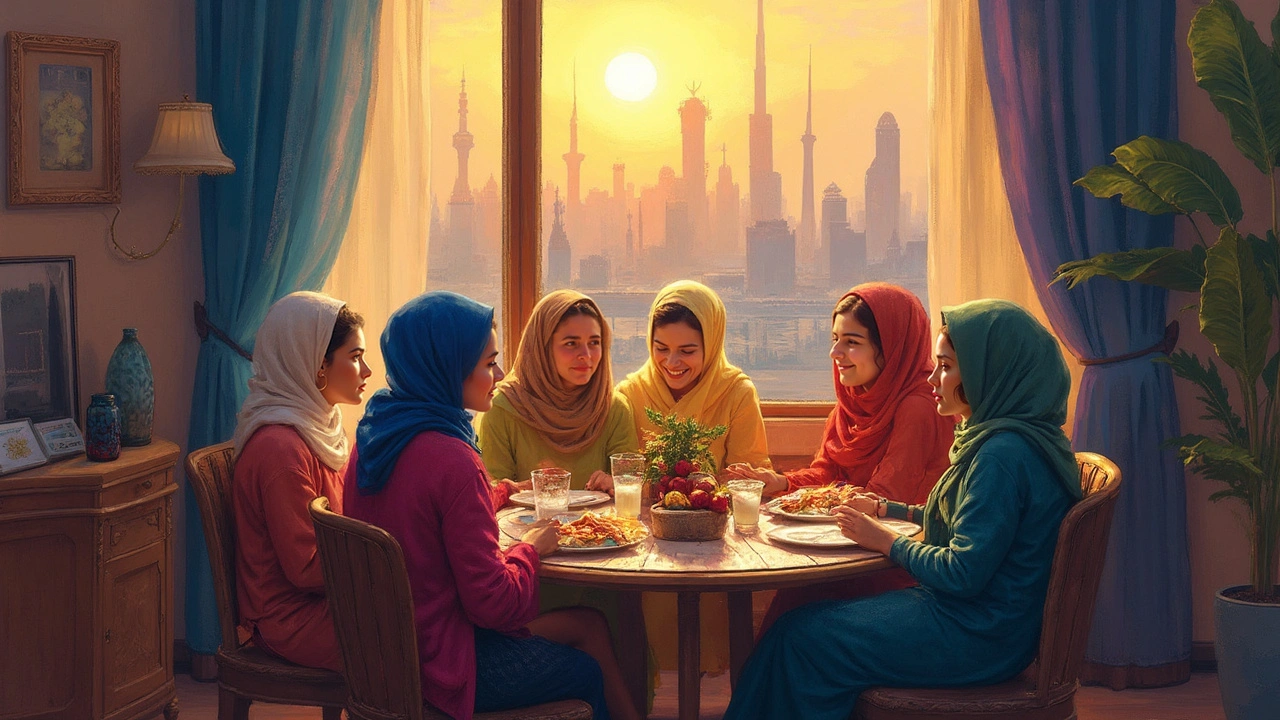Exploring the Lives of 1000-1500 AED Earning Women in Al Bada, Dubai

Living in Dubai on a budget might seem impossible, but it's a reality for many women residing in Al Bada, a bustling area known for its community vibe. Imagine balancing the scales on earnings of 1000 to 1500 AED – it's no easy feat, right? But for many women, this is their everyday life, filled with unique struggles and incredible resilience.
So, how do they manage? They look for affordable housing options, often sharing spaces to cut down on rent. The key here is finding that balance between a decent living space and manageable rent. You'd be surprised to find vibrant communities that have grown from these shared living arrangements, where support and camaraderie blossom amidst tight budgets.
And then there's work. Job opportunities in the area can range significantly – some might work in retail or as domestic helpers, while others might juggle multiple roles across different sectors. The pressure to make ends meet results in a dynamic mix of hustle, creativity, and community reliance. Each story, each woman brings her own flavor to this diverse tapestry of lives woven into the fabric of Dubai's society.
- Introduction to Al Bada
- The Cost of Living Challenge
- Work Opportunities in the Area
- Personal Experiences and Stories
- Tips on Making Ends Meet
- Community and Support Networks
Introduction to Al Bada
Al Bada is a lively part of Dubai that stands out for its unique blend of residential charm and commercial hustle. Nestled between upscale neighborhoods like Jumeirah, it's a mix of cultures and experiences, offering a slice of community life amid the city's grandeur.
Although not as flashy as some other areas in Dubai, Al Bada is a place where residents find a certain peace among its leafy streets and low-rise buildings. Many expats, especially those earning around 1000 to 1500 AED, find Al Bada to be a balanced choice with its accessible facilities and relatively affordable housing options.
“Al Bada presents a welcoming environment for both families and individuals, striking a balance between convenience and community,” according to Emirates Living Magazine.
A little we know about Al Bada is that it's home to various amenities that make it particularly appealing to its residents. There are neat little cafes and eateries, offering an array of cuisines that reflect the multicultural crowd calling this neighborhood home.
Transportation and Accessibility
Al Bada benefits from Dubai's efficient transportation system. Multiple bus routes connect the area to key parts of the city, ensuring residents can easily commute to work or explore the wider region. Taxis are also easily accessible, offering convenience for those late-night shifts or quick trips.
- Proximity to major roadways
- Accessible public transport
- Compact and walkable area
So, if you're on a tight budget but crave the dynamism of Dubai, Al Bada might just be the perfect fit for you.
The Cost of Living Challenge
Living in Al Bada on a 1000-1500 AED salary is a bit like walking on a tightrope – one misstep, and things can spiral out of control. Most folks in this income bracket look for creative ways to budget their expenses. Housing, food, and transport are the big three expenses, but there are clever ways to manage these costs.
Housing Costs
Finding affordable accommodation is a priority. Many women opt for shared apartments, saving on rent while still living in decent areas. You might find a cozy room for around 500-700 AED if you share, leaving you with some breathing space for other expenses.
Food and Groceries
When it comes to food, buying in bulk from local markets can lower costs. Sticking to basic staples like rice, lentils, and vegetables can significantly stretch the budget. Many also benefit from community kitchens where meals can be prepared collectively, adding both savings and a sense of community.
Getting Around
For transportation, most opt for using public transport, which is both affordable and reliable in Dubai. The metro and buses serve as lifelines here, with fares kept low to make day-to-day commuting manageable.
Managing Unexpected Expenses
Life’s surprises demand that there's a small reserve fund. Working with a monthly budget planner can reveal areas to save more and prepare for emergencies without a last-minute scramble.
Women in Al Bada have proven time and again that with some resilience and a supportive community, they can make the most of their limited resources. The struggle is real but so is the determination.
Work Opportunities in the Area
Finding work in Al Bada can be quite the adventure for many women managing on a 1000 to 1500 AED paycheck. One of the popular sectors here is retail. Many stores in the area are constantly on the lookout for staff, offering roles that might suit different skill levels and experiences.
For those who enjoy working with families or those who have nurturing skills, there's a demand for domestic help. The expat community in Dubai often looks for nannies and housekeepers, providing job opportunities with flexible hours. This is one of the most straightforward ways to maintain a steady income.
"In Dubai, every type of job, no matter how small, plays a crucial role in the grand scheme," said Sara Khalil, an employment specialist based in Dubai.
Small Business and Entrepreneurship
There is also a growing trend among these women to pursue small businesses. You might find home-based bakers or craftspeople selling their products online or in local markets. These ventures are not only a source of income but a creative outlet as well.
Freelancing Options
With the gig economy taking off worldwide, even Dubai sees a surge in freelancing. Skills such as writing, graphic design, or tutoring can be leveraged to provide additional income. Freelancing can be particularly appealing due to its flexibility, allowing women to balance work and family seamlessly.
Training and Skill Development
Aiming to boost employment prospects, several local NGOs and community centers offer free or low-cost skills training. From computer literacy courses to language classes, these programs help women expand their horizons.
Job hunting might not always be easy, but with a mix of traditional roles, entrepreneurial spirit, and freelancing, these determined women in Dubai showcase the resilience and adaptability necessary to get by in such a dynamic city.

Personal Experiences and Stories
Every journey is unique, especially for women living in Al Bada, Dubai, often managing on an income of 1000 to 1500 AED. For instance, let’s talk about Fatima, who moved from a small village in the Philippines. Despite the financial challenges, she remained determined to provide a better future for her family back home. She's now working as a retail assistant in a local shop. Her day typically starts before sunrise, as she shares a modest apartment with three others to cut down on living expenses.
The vibrant streets of Al Bada offer her a sense of community. She often visits the fish market, where she forms connections that stretch beyond mere transactions. This network becomes a lifeline, offering moral support and sometimes even little financial help when times are tough.
Managing Finances
Aisha, from India, chose to work part-time across different sectors. Engaging in domestic work during the mornings and clerical work in the evenings, she stretches herself but stays hopeful. Her budding dream is to one day open a tailoring shop. So how does she manage her finances?
- Budgeting: Keeping track of every dirham is essential, so she diligently notes down her daily spendings.
- Sharing Costs: She shares accommodation with five other women, which helps significantly in reducing monthly rent and utility costs.
- Community Support: She takes part in community gathering events for shared meals, helping cut down on food expenses.
This life isn't free of pressure, but as Fatima and Aisha demonstrate, resilience and community ties form the backbone of their survival here. Their stories echo the countless echoing efforts of women in similar situations, proving that hope and hard work go hand-in-hand even in the face of adversity.
Tips on Making Ends Meet
Facing the financial challenge of living on a 1000 to 1500 AED monthly budget in Al Bada, Dubai, takes some strategizing and a touch of creativity. It's all about making every dirham count and leaning on smart practices that anyone can adopt. Here's how many women are pulling it off.
Budget-Friendly Housing
Finding affordable housing is top priority. Many opt for shared accommodations, which significantly lower rent costs. These shared homes often form tight-knit communities where everyone chips in, creating a supportive environment that extends beyond just financial savings.
Stretching the Dirham
Grocery shopping can be turned into an art form: seeking discounts, buying in bulk, and not being afraid to explore smaller, budget-friendly grocery stores or visiting local markets. Cooking at home saves quite a bit compared to eating out, plus it's a chance to bond over shared meals.
Job Multitasking
Taking multiple jobs or gigs can spread the financial burden. Retail jobs, domestic work, freelance gigs online, or even short-term roles can help boost income. Many women embrace a diverse work life, adapting skills to different opportunities available in Al Bada and beyond.
Community Support and Sharing
Being part of local community groups isn't just about personal connections; it's practical too. These networks often share resources, swap goods, and offer support. Imagine a clothes swap meet instead of buying new – it's budget-friendly and environmentally conscious!
Here's a quick look at common expense categories and their usual monthly cost:
| Expense Category | Typical Monthly Cost (AED) |
|---|---|
| Housing (shared) | 500 - 700 |
| Groceries | 250 - 400 |
| Transportation | 100 - 200 |
| Utilities | 50 - 100 |
Smart saving, creative spending, and community spirit make all the difference. While none of this is easy, the women here show that with a bit of savvy, life on a tight budget doesn’t have to mean compromising on quality of life.
Community and Support Networks
In Al Bada, women earning between 1000 and 1500 AED often rely heavily on their community and other support networks. These networks are more than just a means of survival; they provide emotional support, financial advice, and the occasional helping hand when things get tough.
Many of these women form strong bonds with their roommates. Sharing living spaces not only helps cut costs but also builds a sense of solidarity. This is incredibly valuable when someone's having a particularly hard time and needs support, either by lending a hand with chores, sharing meals, or offering advice based on their own experiences.
There are also local organizations and community centers that offer aid to women in need. Some provide free workshops that teach essential skills, like budgeting or language classes, which can improve job prospects. This kind of support is crucial for those trying to increase their earnings or adapt to living in such a dynamic city.
Shared Resources and Activities
Sharing extends beyond just living spaces. Many community groups share resources like books and educational materials, further enriching their collective knowledge and skills. Libraries often double as community centers where people gather for various activities.
Organized events, like weekend markets and group outings, allow residents a chance to socialize and relax without breaking the bank. These events help strengthen community bonds, making life in Dubai not just livable but enjoyable.
Digital Support Groups
The rise of digital communication has also created online support groups specifically for women earning lower wages. These platforms are convenient for sharing tips, finding deals, and offering support when face-to-face interaction isn't feasible.
Some groups even organize meetups where members can gather in person to exchange stories and experiences. It's incredible how technology bridges gaps and creates opportunities for connection and support, even in a city as buzzing as Dubai.